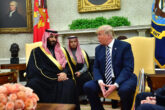December 16, 2019
Add Economic Policy to Deterrence Planning
American defense leaders have adapted over the years to shifts in technology and conflict — for example, accepting space and cyber as principal warfighting domains and integrating them into planning and thinking about deterrence and escalation. But national security policymakers are overdue to incorporate economic instruments, such as sanctions and trade controls, into planning for conflicts and crises.
From Russia and North Korea to Iran and Venezuela, U.S. presidents and lawmakers have long employed varying levels of economic pressure to alter the policies of foreign governments. Some of these tools – for instance, severing links between a country and the international financial system – can impose greater costs than some uses of military force. Yet policymakers have given too little thought to how different types of economic pressure intersect with different forms of military coercion.
One way to do better would be to develop a whole-of-government framework for conflict escalation, as we recommend in a new Center for a New American Security report. The National Security Council should coordinate an interagency effort to formalize this framework, working with independent experts and international allies, and then adopt it in the planning process. Equally important, U.S. government officials should publicly discuss the finalized framework so that partners and competitors do not misunderstand what it means when the United States uses powerful economic tools.
Read the full article in Defense One.
More from CNAS
-
Strengthening the Economic Arsenal
Foreword By David S. Cohen Sanctions occupy a strange place in U.S. national security. For many years, they were derided as mostly ineffective. The received wisdom was that sa...
By Elizabeth Rosenberg & Jordan Tama
-
Middle East Security / Energy, Economics & Security
Trump Inks $600 Bn Deal In Saudi Arabia | Musk, Blackrock CEO Flank Trump In Gulf VisitIn today's episode of India Global, U.S. President Donald Trump secured a $600 billion commitment from Saudi Arabia on Tuesday to invest in the United States. NDTV's Gaurie Dw...
By Daniel Silverberg
-
Energy, Economics & Security / Technology & National Security
Tariffs and Tech: An Uncertain RecipeHigher tariffs could prompt American cloud companies to shift more of their capital investments abroad....
By Pablo Chavez
-
Trump Tariffs: How Will U.S. Plans Reshape the Global Economy?
Donald Trump says he's already decided the tariffs he will impose on countries that export goods to America, including the United Kingdom. Channel 4 hears from Emily Kilcrease...
By Emily Kilcrease




